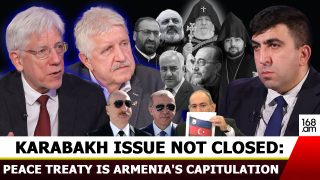Artsakh military-political leadership was arrested on the basis of a political order. Siranush Sahakyan
The issue of prisoners is sensitive, humanitarian, and it is very important that specialists from different spheres keep the problem in the center of attention. Siranush Sahakyan, specialist in international and constitutional law, representative of Armenian prisoners at the European Court of Human Rights (ECHR), president of the Center for International and Comparative Law, said this during the discussion titled “Tigranashen should not be surrendered”.
The latter mentioned that the issue of prisoners arose in 2020, during the war, because in 2016 we didn’t have any prisoners during the four-day war.
“We had hundreds of prisoners, including civilians, and international humanitarian law, as we know, prohibits the capture of civilians,” said Siranush Sahakyan.
According to her, at the moment we have around 210 prisoners who have been repatriated, 23 Armenians are continuously held, but 5 out of 23 were captured during the 2020 war.
“We have two prisoners of war who took part in military operations in October, we have 3 civilians who were essentially captured in the days following the announcement of November 9, when they just crossed into an area that they did not have accurate information about, after which they were captured, then we have the abduction and arrest of two civilians, which was connected with getting lost in the settlement and one case being transported to Armenia for health purposes accompanied by the Red Cross, and yes, the question refers to the famous case of Vagif Khachatryan. The other 16 cases are related to the September 2023 attack. 8 were located in the settlements where military operations took place, that is, 7 were participants in military operations on a voluntary basis, one was an elderly civilian. And the other 8 are the military-political leadership of Artsakh, who, in my estimation, are neither prisoners nor prisoners of war, because depriving them of their freedom has no direct or even indirect relation to combat operations or their results. They are persons who were arrested on the basis of political orders and are still being held illegally at the moment, who are being punished for their expressed opinions, activities and, why not, the realization of the right to self-determination of Artsakh, and it can be said that keeping them in illegal detention also has a symbolic meaning. It is apparent that Artsakh’s right to self-determination has been stifled by the use of force, the possibilities of its revival are highly unknown, and by imprisoning these persons who contributed to the establishment of that statehood, this right is also imprisoned for an indefinite period. And it is clear that the way the mentioned persons were arrested, are currently in prison or will stand before the court in the future, they also contain elements degrading national dignity,” he said.
According to Siranush Sahakyan, the problem of prisoners is not limited to this, because there are people who were captured, but Azerbaijan refuses to accept the fact of their capture.
1″Here we are faced with a problem of double complexity, first we have to prove that they are alive in Azerbaijan at this moment, get confirmation of their capture by Azerbaijan, and then work towards their release. 4 years is too long a period of time to disprove the circumstance of captivity. From a legal point of view, they are now forcibly disappeared persons. We cannot say what happened to these people at the moment. It is possible that they are currently in prison in secret places, but we do not except that they are deprived of their lives. According to our information, at least 80 prisoners have been forcibly disappeared. Regardless of what kind of unwanted events happened to them, the state is obliged to investigate and tell the truth to the families who are suffering from mental suffering for a long time, which has its legal qualification internationally,” he said.
According to the representative of the Armenian prisoners at the ECHR, there is also a third group, and in this case we are talking about the missing persons.
“In the case of enforced disappearances, we have evidence that the person was captured, was in prison, even if he was alive for a short time. In the case of the missing, we have no such evidence. In the case of the missing, there is also a presumption that they were killed on the battlefield, and due to the ineffectiveness of the search operations, we simply did not find their bodies or remains. In many cases, these remains may have been found, but due to the problems of DNA research, they were not identified,” he said, adding that both the Republic of Armenia and Azerbaijan bear bilateral responsibility for the missing persons.
Siranush Sahakyan noted that the work for the return of prisoners should be carried out in two directions: political and legal, and although the results of the legal work are not very visible, he considers them a straitjacket.
“Political processes may or may not actually secure the release of the captives, given that this issue has become a bargaining chip, and Azerbaijan is essentially holding the captives as hostages to pressure the government and society. Legal processes are an indication that if the problem is not solved politically in a short time in favor of humanitarian issues, then they are not dead ends and the problem will be solved in court processes. I would also like to mention that measures to secure the claim have been applied against these persons in a legal way, which means that their lives are taken under international protection. Both in individual cases and in the framework of an interstate complaint, Azerbaijan periodically provides the court with information on the conditions of detention and health status of these persons. At least from the point of view of the right to life, they are insured,” said Siranush Sahakyan.
The latter also made it very important to use public diplomatic tools to return the captives.
“It is possible to generate international pressure on Azerbaijan if we have condemning appeals, resolutions, reports that are accepted by international structures, individual states or international non-governmental organizations, and intensive work should be done in this regard. In the near future, the action on climate change is very important. Within this framework, the release of prisoners can be demanded,” said Siranush Sahakyan.
The latter noted that we should not forget that the trials of the military-political leadership of Artsakh are expected in Azerbaijan, and they will resemble the Nuremberg trial.
“An intensive international presence should be provided to those trials. International experience proves that employees of diplomatic missions can be present at these trials, personally follow its course and also report. There are also some structures that specialize in the monitoring of trials themselves. Because these trials are going to be staged and the outcomes are, I believe, predetermined, we have to find ways to neutralize such outcomes, and one of the best ways to do that is to have an international presence at these trials. I think that different public groups should be consolidated, send letters to the diplomatic representations present in Azerbaijan, so that the latter are present at these trials,” said Siranush Sahakyan.
Details in the video.

























